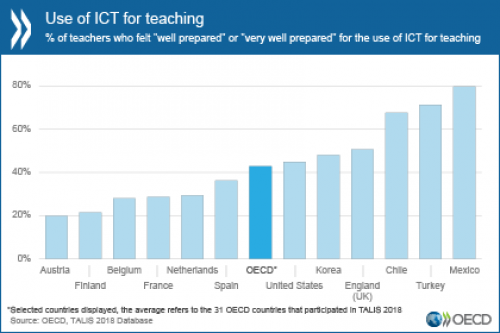Countries must make teaching profession more financially and intellectually attractive
Countries need to make the teaching profession more financially and intellectually attractive to meet a growing demand across the world for high-quality teachers, according to a new OECD report.

Based on the OECD’s Teaching and Learning International Survey (TALIS), the report, Teachers and School Leaders as Lifelong Learners, says that attracting the best and brightest to the profession will be essential to ensure that young people are given the skills they will need to thrive in tomorrow’s world of work.
About 260,000 teachers and school leaders at 15,000 primary, lower and upper-secondary schools from 48 countries and economies took part in this third edition of the survey. Through the voices of teachers and school leaders, it aims to help strengthen the knowledge and skills of the teaching workforce to support its professionalism.
The findings show that much still needs to be done to give teachers better opportunities to prepare for tomorrow’s world. Little more than half of teachers across participating OECD countries received training in the use of technology for teaching, and less than half felt well prepared when they joined the profession. Yet two thirds of teachers report that the most useful professional development they took part in focused on innovation in their teaching.
“The acceleration of technological, economic and social changes makes it imperative that our education systems adapt almost in real time,” said Ludger Schuknecht, OECD Deputy Secretary-General, launching the report in Paris. “Policy makers should work closely with teachers and school leaders and leverage their expertise to help students succeed in the future world of work.”
“The quality of an education system can never exceed the quality of its teachers,” said Andreas Schleicher, OECD Director for Education and Skills. “Governments should empower their teachers and school leaders with the trust and autonomy they need to innovate and instil a collaborative culture in every school. They also need to better recognise the importance and value of involving teachers in designing better practices and policies to create classrooms fit for the future.”
Schools appear to be recognising the value of innovative teaching in responding to the challenges of the 21st century, according to the survey. The vast majority of teachers and school leaders say their schools are open to innovative practices and have the capacity to adopt them. On average across OECD countries in TALIS, 78% of teachers also report that they and their colleagues help each other implement new ideas. However, teachers in Europe are less likely to report such openness to innovation.
The report finds that recent changes in migration flows have affected the makeup of classrooms. Almost one-third of teachers in OECD countries report that they work in schools where at least 1% of the student population are refugees, and 17% of teachers work in schools where at least 10% of the students have a migrant background.
95% of school leaders report that their teachers believe that children and young people should learn that people of different cultures have a lot in common. 80% of teachers report working in schools that have integrated global issues throughout the curriculum, as well as teaching their students how to deal with ethnic and cultural discrimination.
Other key findings include:
Teaching as a career
Teaching was the first-choice career for two out of three teachers in participating OECD countries, but only for 59% of male teachers, compared to 70% of female teachers.
90% of teachers cite the opportunity to contribute to children’s development and society as a major motivation to become a teacher, and only 61% say that the steady career path offered by teaching was an important part of their decision making.
Teacher profiles
Teachers are, on average, 44 years old, ranging from 36 in Turkey to 50 in Georgia. Most teachers are women (68%), except in Japan (42%), while only 47% of principals are women.
ICT use
Only just over half of teachers (56%) across the OECD received training in the use of ICT for teaching as part of their formal education or training. ICT training is lowest in Sweden (37%) and Spain (38%) and most common in Chile (77%) and Mexico (77%).
About 18% of teachers across the OECD still express a high need for professional development in ICT skills for teaching.
One in four school leaders report a shortage and inadequacy of digital technology as a hindrance to providing quality instruction.
In the classroom
In OECD countries and economies participating in TALIS, only 78% of a typical lesson is dedicated to teaching, with the rest spent on keeping order (13%) and administrative tasks (8%).
Classroom time spent on actual teaching and learning is much lower in schools with high concentrations of students from socio-economically disadvantaged homes. Differences are particularly marked in Alberta (Canada), Australia, Austria, England, the Flemish Community of Belgium, France, Saudi Arabia, South Africa and the United States.
Relations between students and teachers have improved in most countries since 2008, with 95% of teachers agreeing students and teachers usually get on well with each other. However, 14% of principals report regular acts of intimidation or bullying among their students.
Professional development
More than 90% of teachers and principals attended at least one professional development activity in the year prior to the survey. But only 44% of teachers take part in training based on peer learning and networking, despite collaborative learning being identified by teachers as having the most impact on their work.
Around half of teachers and principals report that their participation in the professional development available to them is restricted by scheduling conflicts and lack of incentives.
Source: Organisation for Economic Co-operation and Development
- 533 reads
Human Rights
Fostering a More Humane World: The 28th Eurasian Economic Summi

Conscience, Hope, and Action: Keys to Global Peace and Sustainability

Ringing FOWPAL’s Peace Bell for the World:Nobel Peace Prize Laureates’ Visions and Actions

Protecting the World’s Cultural Diversity for a Sustainable Future

Puppet Show I International Friendship Day 2020

